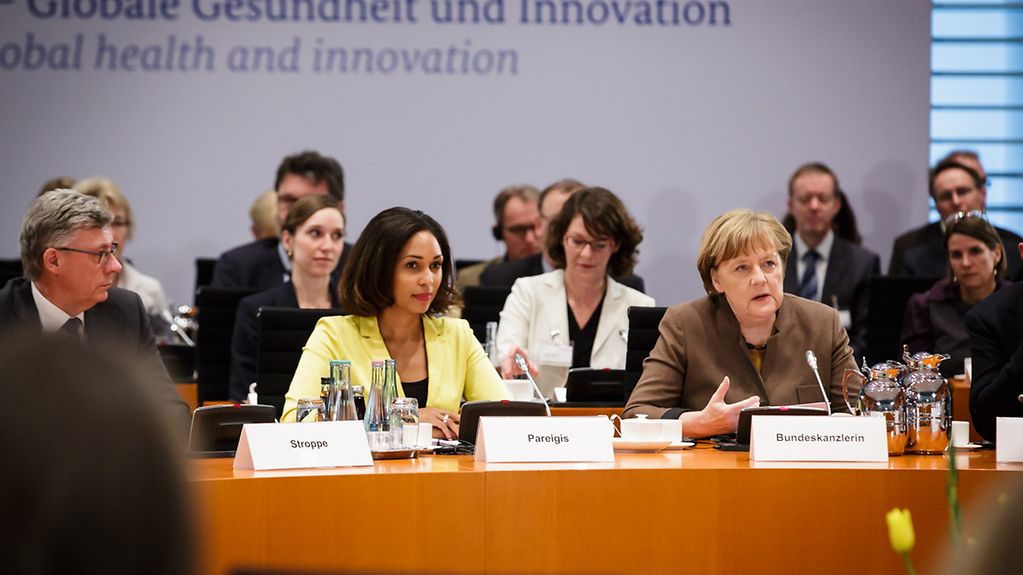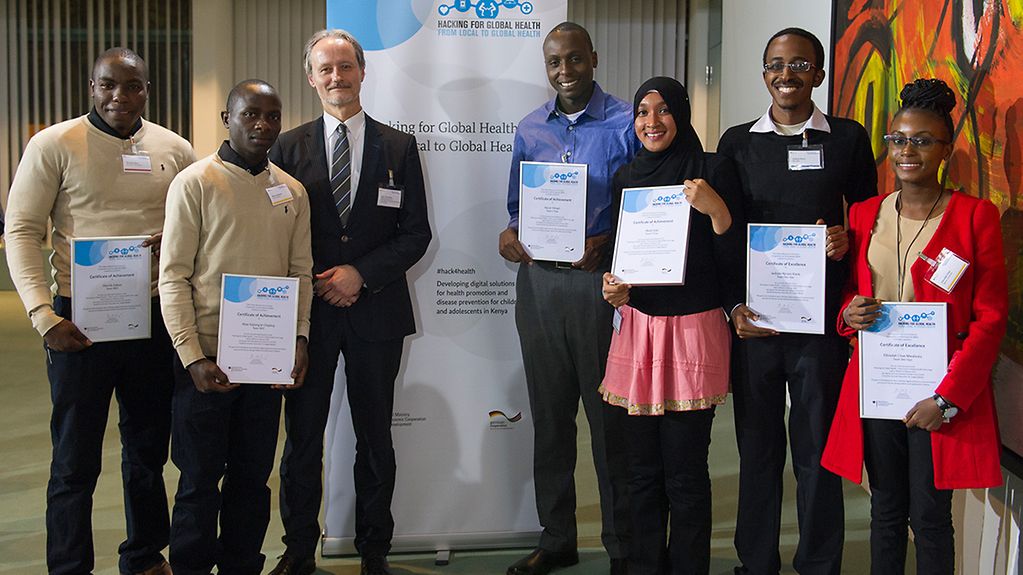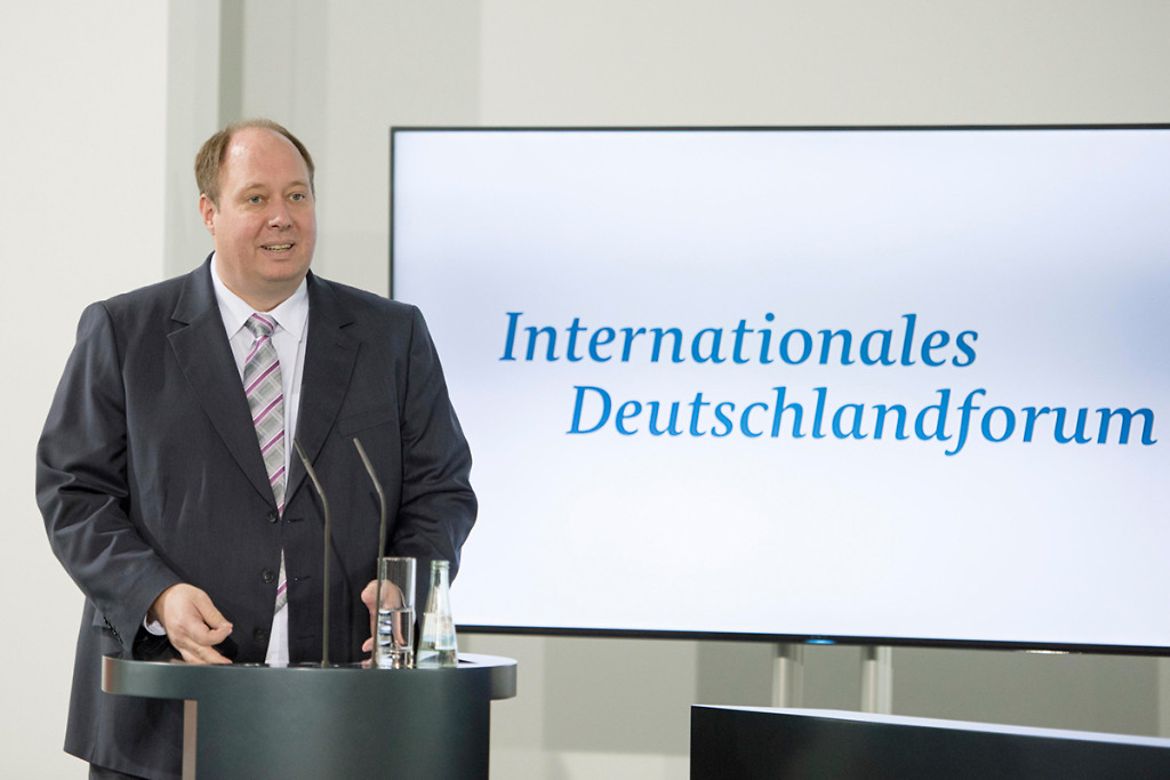February 2017
The war on infectious diseases is one focus of Germany’s G20 Presidency, stressed the Chancellor at the Third International German Forum. At the Federal Chancellery, experts from 25 countries met to discuss ways of enhancing health and the quality of life – and flying medical robots.
7 min reading time

Experts from 25 countries discussed ways of improving health and quality of life with Chancellor Angela Merkel
Photo: Bundesregierung/Steins
The two-day Forum offered an opportunity to develop good ideas on how to improve global health – adopting inter-sectoral, interdisciplinary and international approaches. The Forum also aimed to strengthen international cooperation, which is crucially important in order to prevent or address transnational outbreaks of diseases.
Health – a G20 priority
As Chancellor Angela Merkel stressed, Germany intends to use its G20 Presidency to draw attention to the threat posed by infectious diseases, which can quickly spread across entire countries or even continents. To this end there will be a first ever meeting of G20 health ministers during Germany’s G20 Presidency.
The Ebola crisis demonstrated that the international community was not sufficiently well prepared, declared the Chancellor. For this reason Germany put antimicrobial resistance and neglected tropical diseases on the agenda of its G7 Presidency in 2015.
Angela Merkel thanked the 120 participants at the International German Forum for the exchange of views and experience. Germany wants "to learn from you" so that this expertise can be incorporated in international discussions. "Keep networking!" was the Chancellor’s request to all those present.
Harnessing the opportunities offered by modern communication technology
Around the globe, information and communication technology is one of the main drivers of innovation in the health sector. Digital solutions offer a huge potential, for instance to improve health care delivery in remote areas through telemedicine, to analyse data thoroughly, and to train health service staff.
Morten Elbaek Petersen from Denmark presented Europe’s largest e-health programme, which enables Danish citizens and health service staff to access information and individual health data from any location. The Chancellor was impressed by this pioneering feat. She compared this with the difficulties encountered in Germany with the introduction of a standardised health card on which patient data would be stored.
Dhesi Raja is conducting research in the USA and Malaysia, with a view to using artificial intelligence to predict the outbreak of epidemics such as the Zika virus or dengue fever. The machine he has developed, AIME (Artificial Intelligence in Medical Epidemiology), makes it possible to localise epidemics three months in advance.
Meanwhile, Jonathan Ledgard’s goal is to build drone bases across Africa. Flying robots are to accelerate the transport of medical drugs and emergency equipment. He is currently planning the world’s first base, designed by architect Sir Norman Foster.
Improving the way antibiotics are used
The high and often inappropriate use of antibiotics around the globe is resulting in ever more resistant strains of bacteria. Antibiotics are then no longer effective. It is estimated that antibiotic-resistant pathogens are responsible for 700,000 deaths every year.
At the International German Forum, Alison Holmes, Professor of Infectious Diseases at Imperial College, London, called for the circumspect and rational use of antibiotics. She urged participants to focus use primarily on hospitals.
Several participants presented their innovative approaches to improving medical care and preventing diseases and epidemics. Bright Simons from Ghana, for instance, founded the "mPedigree" network, which fights counterfeit drugs. The network is already active in 12 African states, where it marks drug packaging as "safe".
In New York, Sofia Ahsanuddin heads the MetaSUB International Consortium. It examines microorganisms in local public transport systems in more than 70 cities around the world, in a bid to better understand antimicrobial resistance and to forecast outbreaks of disease at an earlier stage. Its "world map of invisible life" has already rendered visible very diverse resistance profiles.
Fighting neglected tropical diseases
Worldwide more than one billion people suffer from one or more neglected tropical diseases (NTDs), including Ebola. These diseases often occur in tropical and subtropical regions in which medical care is frequently poor.
John Humphrey Amuasi from Ghana heads the first purely African research network dedicated to these diseases. He called for sound preventive action, efficient diagnosis and treatment, and more research in order to combat NTDs.
Mental health – overcoming the taboo
A large part of the discussion with the Chancellor was dedicated to mental health issues. Around the world, one in four people is affected by mental health issues at least once in their lifetime. But this is a taboo field in many societies and sufferers are stigmatised. Participants considered how societies can achieve a better understanding of mental health and how they can better address mental health problems.
Vikram Patel, a psychiatrist from India, is working to overcome the taboos and stigma related to mental health issues. His "Mental Health Innovation Network" provides an international platform for ideas and solutions.
The Chancellor admitted that this is a field in which every country is a developing country, and one which deserves far greater attention, in Germany as elsewhere.
The International German Forum is complementing Germany’s engagement for health. Many countries face similar problems in an effort to improve the health of their people. This is an area in which all countries and their people can benefit from a discussion of best practices – including ways that the internet, mobile phones and data can be used to improve health information and health care.
The outcomes and ideas to emerge from the discussions held at the Third International German Forum will also be incorporated in Germany’s G20 Presidency in 2017. Event documentation will be compiled after the Forum.
Hacking for Global Health
The Federal Development Ministry’s competition "Hacking for Global Health" promised to be exciting, with the winner to be announced at the Forum. The aim was to develop digital solutions in the field of child and youth health in Kenya. A "hackathon" was held back in November.

The prize-winners of the Federal Development Ministry's "Hacking for Global Health" competition
Photo: Bundesregierung/Loos
At the International German Forum three teams presented their solutions: an app-based micro health insurance scheme, a platform allowing young Kenyans to learn about "taboo" topics, and a messaging service to ensure early referrals of pregnant mothers to skilled health care providers. The jury selected the app-based micro insurance scheme as the overall winner. It addresses low-income parents who get together to set up savings groups to pay for health care for their children. The winning team, headed by Jackson Kiarie and Ethredah Chao, will receive support to help them further develop their software.
"Global health is crucially important"
In her latest video podcast, Chancellor Angela Merkel welcomed the fact that the International German Forum has put human health on the agenda for its third meeting. She stressed that global health is a crucially important issue. With the 2030 Agenda for Sustainable Development, the international community has set itself "the extremely ambitious goal of giving every person in the world, whatever their age, an entitlement to health care". During its G7 Presidency, Germany launched a research initiative to develop vaccines that will give protection against tropical diseases. "We will continue to work hard on this," said the Chancellor.
Germany always has an interest in ensuring that people "elsewhere can live well, so as to address the root causes of refugee movements and migration". That is why Germany supports other countries in developing their health systems, as well as providing swift assistance in the form of funding, and human and material resources when public health emergencies strike, like the Ebola epidemic that shook West Africa between 2014 and 2016.
Background to the International German Forum
Chancellor Angela Merkel launched this new format in 2013. It offers experts from the realms of politics, industry, science and research and civil society the chance to engage in international discussion on the issues that will define our future. The idea of an International German Forum grew from the Chancellor’s Dialogue on Germany’s Future in 2011 and 2012, within the scope of which she discussed with citizens and experts how we want to live in future.
The aim of the International German Forum is to put in place a network for global learning and to devise common solutions to the issues that will define our future. The First International German Forum was held in 2013 and explored "What matters to people – quality of life and progress". The Forum continued in 2015, and focused on "What matters to people – innovation and society".
















